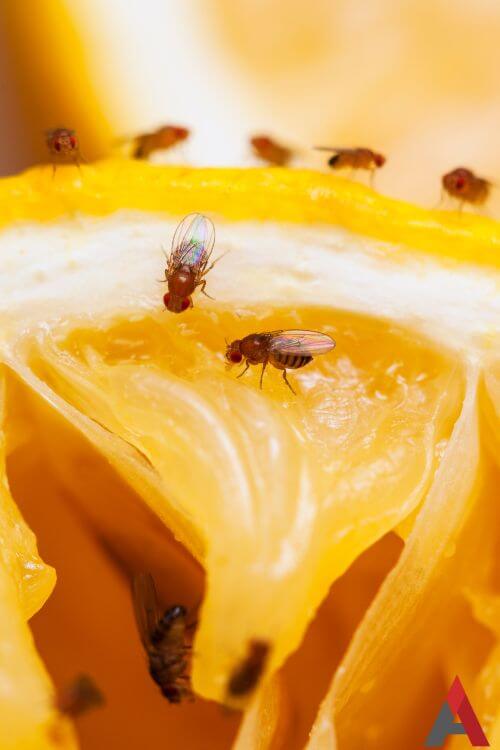
Fruit Flies in North Carolina
Fruit flies are famously tiny but incredibly pesky pests that can quickly invade your home, especially in North Carolina's warm and humid climate. Their rapid reproduction rate and attraction to overripe fruit frequently found in kitchens and pantries means these little flies can become a nuisance in no time at all. Learning about fruit flies, their habits, and how to eliminate them is essential to maintaining a clean and pest-free home.

Where Do Fruit Flies Come From
Fruit flies often enter homes through open doors and windows, or they hitch a ride on fruits and vegetables brought in from grocery stores, farmers' markets, or gardens. These pests are naturally attracted to fermenting or rotting organic matter, making kitchens and pantries a common entry point.
Where Are Fruit Flies Found
Fruit flies are found all over the world, thriving in environments where fermenting organic material is found. In North Carolina, they are especially common in homes, restaurants, grocery stores, and outdoor markets where fruits, vegetables, or other organic waste are left out in the open.
What Attracts Fruit Flies
Fruit bowls
Near ripe or overripe fruits and vegetables on counters or in bowls attracts fruit flies quickly.
Trash cans
Any containers that hold food waste are draws for fruit flies.
Sinks
Leftover food in and around drains or sinks is a common culprit.
Bottles
Flies can also be found around open bottles of soda, wine, beer, or vinegar, which produce the fermenting scents that attract them.
How to Get Rid of Fruit Flies
Getting rid of fruit flies requires a multi-pronged approach to tackle the infestation at its source and prevent it from returning. Here are the essential steps:
Remove Attractants
Fruit flies are drawn to overripe or decaying organic matter. Start by eliminating their primary food sources, checking your kitchen for any spoiled produce, and disposing of it immediately.
Rinse out trash cans and use bags to reduce lingering food odors. If you compost, ensure the pile is properly sealed or managed to prevent fly access.
Clean Surfaces
Flies, from houseflies to blowflies to fruit flies often linger on sticky or dirty surfaces. A thorough cleaning can remove the residue that attracts them. Wipe down your counters with a good disinfectant or soap to clean food preparation areas, and make sure to sanitize sinks and drains where flies can breed. In some cases, you may even need to pour boiling water or a drain cleaner down there to eliminate eggs.
It’s also a good idea to clean your appliances, paying special attention to areas like microwaves, toasters, and stovetops where food crumbs might collect.
Use Traps
Homemade traps like the ones below can be an effective way to reduce the number of fruit flies in your home:
- Apple Cider Vinegar Trap: Pour apple cider vinegar into a small container and add a drop of dish soap. Cover the container with plastic wrap, poke small holes, and leave it near infested areas.
- Dish Soap Solution: The dish soap breaks the surface tension, causing the flies to sink and drown once they land.
- Ready-Made Traps: Consider commercial traps available at stores for added convenience.
Seal Entry Points
Prevent new fruit flies from entering your home by sealing off their access points. That includes repairing any tears in window screens and ensuring doors are tightly sealed, using trash cans with tight-fitting lids, and moving fruits and vegetables to sealed containers in the fridge.
Call Professionals
For persistent or severe fruit fly infestations, professional pest control services may be necessary:
- Thorough Inspection: Professionals can identify hidden breeding sites that might be overlooked.
- Targeted Treatment: Expert pest control technicians use safe and effective methods to eliminate infestations.
- Preventive Measures: A professional service can provide advice or treatments to prevent future infestations.
Frequently Asked Questions
How long does a fruit fly infestation last?
A fruit fly infestation can last as long as food sources and breeding areas are available. With proper cleaning and preventive measures, most infestations can be eliminated within 7 to 10 days.
How do you get rid of fruit fly infestation fast?
To get rid of fruit flies quickly eliminate all overripe fruits and other attractants immediately, deep clean drains, counters, and garbage bins. Use effective traps, such as a vinegar and soap solution.
Contact professional pest control for fast, long-lasting results.
What month are fruit flies most active?
Fruit flies are most active during late summer and early fall when temperatures are warm, and fresh produce is abundant. However, in North Carolina’s mild climate, they can be a year-round issue.
Will fruit flies go away on their own?
Fruit flies are unlikely to go away on their own because they reproduce quickly and thrive in environments with accessible food sources like overripe fruits, vegetables, and organic residue.
Each female fruit fly can lay hundreds of eggs, which hatch into larvae in just 24 to 30 hours, leading to rapid population growth. Unless their breeding sites and attractants are removed, they will continue to multiply.
Are fruit flies dangerous?
Fruit flies are not directly dangerous to humans, as they don’t bite or sting, but they can pose health risks by spreading bacteria and pathogens. Since they breed and feed on decaying organic matter, they can contaminate food and surfaces, potentially causing foodborne illnesses.

